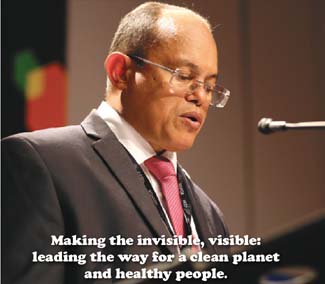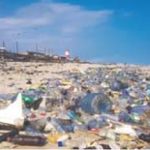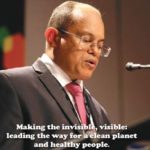
MAKING THE INVISIBLE, VISIBLE : LEADING THE WAY FOR A CLEAN PLANET AND HEALTHY PEOPLE
- INTERVIEW BETWEEN MARIT FOSSE & ROLPH PAYET, EXECUTIVE SECRETARY OF THE BASEL, ROTTERDAM, AND STOCKHOLM CONVENTIONS
The Basel, Rotterdam and Stockholm conventions aim to protect human health and then environment from hazardous chemicals and waste, are legally-binding, almost universal in their global geographical coverage, and are administered by UN Environment in Geneva. I recently caught up with the conventions’ Executive Secretary, Rolph Payet, to find out more.
Marit Fosse (MF):
Dr. Payet, thank you and let us begin. You are a former Minister of Environment and Energy for the Seychelles. Please tell us, how has your island upbringing shaped you in your professional career, and how did that career lead you to the United Nations, and to Geneva?
I am born and raised in the Seychelles, a group of islands more than a thousand miles from any landmass. This feeling of isolation, in environmental terms, indeed came to an end when tonnes of wastes were continuously washed up on some of our inhabited islands, chemicals like DDT found in Indian Ocean whales and the wonderful red sunsets during certain times of the year which presumably arise from air pollution on the continents. Islands are not alone anymore, through our industrialisation and consumption we have spread wastes and chemicals to all the remote corners of the planet. So you can say, this is what prompted me to come to Geneva.
Geneva, this year celebrates 100 years of multilateralism, and with reason, as the city hosts hundreds of organisations and many conventions leading to a positive impact on our planet. The hub for chemicals and wastes multilateral issues reside here in Geneva, and together with the World Health Organisation, The World Trade Organisation and the International Labour organisation, among others, provides the BRS Secretariat with the greatest platform to advance the decisions of the parties to those conventions. And with 187, 161, and 182 parties to the three conventions – Basel, Rotterdam and Stockholm – respectively, the coverage really is global in its extent.
So, the journey from my island to Geneva is to meet the world, and for us to see how we can reverse global pollution and its impacts on human health and our one and only planet.
MF: Very interesting indeed. The inter-connectivity of ecosystems. And we as part of the ecosystems are also therefore connected, for better or for worse. Tell us about the situation regarding chemicals and waste: what does this slogan “Making the Invisible, Visible” actually represent?
- RP: Making the invisible, visible is how we bring the issue of chemicals and wastes to the doorstep and home of each and every consumer without the need for a degree in chemistry or otherwise. Under the present scenario not many consumers know that only 9% of their electronic wastes are actually recycled, and that millions of tonnes of those end up in parts of Africa where children break them up and are thus exposed to toxic chemicals. The modern consumer raids the supermarket and the high streets every day, removes plastic packaging, and throws it away. Cumulatively, such unnecessary packaging becomes millions of tonnes! Who takes a moment to think about what happens to those wastes? We live in societies in artificially-created bubbles where we are not – currently – accountable for our footprint on the planet. It is one thing to pay for an environmental levy on a product and feel exonerated of our environmental responsibilities, and another to see it turn up in the backyard of someone less fortunate, doing them harm, or eventually into our food systems, doing harm to us.
- Because chemicals are everywhere, in the air we breathe, the food we eat, the water we drink. In the furniture we sit on, in the mobile telephone we communicate with, in the cooking equipment we prepare our food with, the clothes we wear. They are in the heavily industrialised regions of the world, and on the highest, most remote, seemingly pristine alpine mountains. They are in our mega-cities, and also in our polar regions. So, we have the responsibility to make them visible!
- We need to be more transparent to our consumers with regards to hazards they are being exposed to – and most importantly and positively, the alternatives – to toxic chemicals. Some years ago, we developed the “Body Burden Man” diagram to illustrate the multiple pathways of hazardous chemicals into our body. Research has also clearly showed that pregnant and nursing mothers, children, and the elderly are most vulnerable.
MF: These are very important, yet quite disturbing conclusions. Thanks for sharing that. Why is it so key that people should be aware of the hazards from chemicals and waste, other than because they have the right to know?
- RP: I see it from two important angles. First, informed people can make better decisions as to their purchasing and disposal habits, and second, they can then play an important role in ensuring the government, private sector do what is necessary to ensure that measures to recycle wastes, for example, are properly undertaken. And in a safe manner, of course, and not illegally dumped in a remote country.
- Indeed many studies have confirmed that implementation of our conventions and national laws, especially environmental laws, at national and local levels is improved when citizens are well-armed with information. Tackling the challenges of chemicals and waste requires partnership between the international community, individual governments, the private sector and the general public, so the better-informed people are, the better the implementation.
- And in fact, so many solutions are actually already there! Ecological agriculture to produce food without harmful pesticides; organic cotton for our clothing and bedding; mosquito nets to prevent malaria whilst avoiding the spraying of harmful chemicals such as DDT; innovative solutions to waste management; the advent of circular economy, life-cycle approaches to product design, use and recycling; lead-free paint; the list is endless. We need to embrace and promote these solutions.
MF: Take marine plastic litter. What is happening with the recent groundswell of public awareness on that?
- RP: A great example indeed! It is in some ways many decades too late, but now we have the attention of the public, let’s do something about it! Governments have recognised and responded to this heightened sensitivity around this issue, be it the large number of countries which have introduced and are now enforcing bans on single-use plastic bags, such as Kenya, or be it the many countries which are collectively throwing human and financial resources into international processes aiming at tackling this global problem in a coordinated and connected manner. But there is more that can be done, and I am confident more would be done. The observation of plastic particles in our food should not be taken lightly.
MF: Can you say more?
- RP: Of course. For example, Norway, a country you feature elsewhere in this magazine, has been quite instrumental in providing international leadership, and also financial resources, to help engage governments and stimulate UN efforts to pull together state-of-the-art information, analysis of policy gaps, and the discussion of potential governance options, for tackling marine plastic pollution, including through the Basel Convention. In fact, a growing group of countries, both in the developed and developing world, are calling for clear and tangible action on the issue of plastics. It is one area, they declare, that we have had enough talk – we now need impactful action – and I agree with them. For this reason, I am very excited that the meeting of the Conference of the Parties to the Basel Convention will be considering a range of concrete actions to address this issue, including a proposal for more comprehensive coverage of the plastic wastes moved across borders.
MF: What meeting is that?
- RP: Every two years the parties (governments) come together to take decisions on the sound management of chemicals and waste, within the legal framework of the three international conventions – the Basel, Rotterdam and Stockholm conventions. Those decisions should then be given effect in those countries that are parties to those conventions. This year, our Triple Conference of the Parties (or COPs) will run from 29 April to 10 May under the banner of “Clean Planet Healthy People” and we hope that it will send a strong message that we indeed need to clean up our planet for the sake of the health of all.
- Our message is that even if wastes are being dumped far away from where we got rid of them, in remote locations, there is clear scientific evidence that their hazards come back through our air, food and water. If there is one thing on our planet that we cannot hide – it is our waste. Sooner or later it will be washed up on our coasts, turn up in our food, in the air we breathe. I challenge anyone to bring me a glass of naturally collected water which does not contain any manmade chemical or microplastic!
MF: The COPs sound interesting. What else apart from marine plastic waste is on the agenda?
- RP: Both the Rotterdam and Stockholm conventions will also work on the possible listing of more chemicals either for further controls or outright restriction. This is done through a robust scientific review process. They will be deciding upon chemicals found in fire extinguishers, non-stick cookware, and other items we use at home – for example in stain-resistant textiles such as carpets – and which have been found to be linked to major health issues such as kidney cancer, testicular cancer, thyroid disease, pregnancy-induced hypertension, and high cholesterol.
MF: Non-stick pans? What can people do then, at the individual level, to protect themselves and their families from these “invisible hazards”?
- RP: Well, once aware, people can do a host of things which will lower their own exposure, and at the same time benefit the environment. Some of these actions might even save them money! Changing habits is the first step. Choose cooking pans with safer coatings, for example. Cutting down on waste is a no brainer!
- Especially avoiding single-use plastics and by reusing or recycling as much as one can. In some circles some consumers have adopted the slogan – If it can’t be reused or recycled, refuse it!
- At our COPs we will also be encouraging all delegates to walk the walk. For many years now, our meetings have been paperless, we have also made them carbon-neutral, and since last year we have increased our efforts in reducing wastes and eliminating the use of single-use plastic materials. This year, we will be asking the delegates to BYOBottle: Bring Your Own Bottle – as there will indeed be no plastic water bottles available or sold.
MF: Wonderful! Dr Payet, thank you for explaining all about chemicals and waste, good luck with those important decisions at the COPs, and we look forward to hearing positive outcomes for human health and environment very soon.
- RP: Thank you Marit, it has been a pleasure. I urge anyone interested in finding out more, including our colleagues from the media, to consult our websites at www.brsmeas.org or to follow us on Twitter @brsmeas









